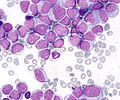Acute myeloid leukemia
| Acute Myeloid Leukemia | |
|---|---|
| Synonyms | Acute myelogenous leukemia, acute nonlymphocytic leukemia |
| Pronounce | |
| Specialty | Oncology, Hematology |
| Symptoms | Fatigue, fever, increased risk of infection, bleeding |
| Complications | Anemia, infection, bleeding, spread to other parts of the body |
| Onset | Rapid |
| Duration | |
| Types | M0–M7 (based on the French-American-British (FAB) classification) |
| Causes | Genetic mutations, exposure to radiation, previous chemotherapy, smoking |
| Risks | Age, smoking, previous chemotherapy, genetic disorders |
| Diagnosis | Blood tests, bone marrow examination |
| Differential diagnosis | Acute lymphoblastic leukemia, Myelodysplastic syndrome, Aplastic anemia |
| Prevention | |
| Treatment | Chemotherapy, Bone marrow transplantation, targeted therapy |
| Medication | Cytarabine, anthracyclines |
| Prognosis | Variable; depends on subtype, age, and genetics |
| Frequency | |
| Deaths | |
Acute myeloid leukemia (AML) is a type of cancer that affects the blood and bone marrow. AML is characterized by the rapid growth of abnormal white blood cells that accumulate in the bone marrow and interfere with the production of normal blood cells. It is the most common type of acute leukemia in adults.
Signs and Symptoms[edit]
The symptoms of AML are caused by the replacement of normal bone marrow with leukemic cells, which leads to a drop in red blood cells, platelets, and normal white blood cells. Common symptoms include:
- Fatigue
- Fever
- Increased risk of infections
- Bleeding and bruising easily
- Shortness of breath
- Pale skin
Causes[edit]
The exact cause of AML is not known, but several risk factors have been identified:
- Genetic mutations
- Exposure to radiation
- Previous chemotherapy treatment
- Smoking
Pathophysiology[edit]
AML involves mutations in the DNA of a cell in the bone marrow. These mutations cause the cell to grow and divide uncontrollably. The accumulation of these abnormal cells, or blasts, in the bone marrow inhibits the ability to produce normal blood cells.
Diagnosis[edit]
Diagnosis of AML typically involves:
- Complete blood count (CBC)
- Bone marrow biopsy
- Cytogenetic analysis
- Molecular genetic testing
Treatment[edit]
Treatment for AML can vary based on the characteristics of the leukemia and the overall health of the patient. Common treatments include:
- Chemotherapy
- Bone marrow transplantation
- Targeted therapy
Prognosis[edit]
The prognosis for AML varies widely depending on several factors, including the subtype of AML, the patient's age, and the genetic abnormalities of the leukemia cells. Some subtypes have a relatively good prognosis, while others are more challenging to treat.
Epidemiology[edit]
AML is more common in adults than in children and is slightly more prevalent in men than in women. The incidence increases with age.
See Also[edit]
Acute myeloid leukemia[edit]
-
Acute Myeloid Leukemia (M2 type)
-
AML Case 66
-
Diagram showing the cells in which AML starts
-
Myeloblast with Auer rod smear
-
Relative incidence of acute myeloid leukemia subtypes
-
Survival curve by age at diagnosis
-
9;11 translocation
-
Alfred Velpeau
Ad. Transform your life with W8MD's Budget GLP-1 injections from $49.99


W8MD offers a medical weight loss program to lose weight in Philadelphia. Our physician-supervised medical weight loss provides:
- Weight loss injections in NYC (generic and brand names):
- Zepbound / Mounjaro, Wegovy / Ozempic, Saxenda
- Most insurances accepted or discounted self-pay rates. We will obtain insurance prior authorizations if needed.
- Generic GLP1 weight loss injections from $49.99 for the starting dose of Semaglutide and $65.00 for Tirzepatide.
- Also offer prescription weight loss medications including Phentermine, Qsymia, Diethylpropion, Contrave etc.
NYC weight loss doctor appointmentsNYC weight loss doctor appointments
Start your NYC weight loss journey today at our NYC medical weight loss and Philadelphia medical weight loss clinics.
- Call 718-946-5500 to lose weight in NYC or for medical weight loss in Philadelphia 215-676-2334.
- Tags:NYC medical weight loss, Philadelphia lose weight Zepbound NYC, Budget GLP1 weight loss injections, Wegovy Philadelphia, Wegovy NYC, Philadelphia medical weight loss, Brookly weight loss and Wegovy NYC
|
WikiMD's Wellness Encyclopedia |
| Let Food Be Thy Medicine Medicine Thy Food - Hippocrates |
Medical Disclaimer: WikiMD is not a substitute for professional medical advice. The information on WikiMD is provided as an information resource only, may be incorrect, outdated or misleading, and is not to be used or relied on for any diagnostic or treatment purposes. Please consult your health care provider before making any healthcare decisions or for guidance about a specific medical condition. WikiMD expressly disclaims responsibility, and shall have no liability, for any damages, loss, injury, or liability whatsoever suffered as a result of your reliance on the information contained in this site. By visiting this site you agree to the foregoing terms and conditions, which may from time to time be changed or supplemented by WikiMD. If you do not agree to the foregoing terms and conditions, you should not enter or use this site. See full disclaimer.
Credits:Most images are courtesy of Wikimedia commons, and templates, categories Wikipedia, licensed under CC BY SA or similar.
Translate this page: - East Asian
中文,
日本,
한국어,
South Asian
हिन्दी,
தமிழ்,
తెలుగు,
Urdu,
ಕನ್ನಡ,
Southeast Asian
Indonesian,
Vietnamese,
Thai,
မြန်မာဘာသာ,
বাংলা
European
español,
Deutsch,
français,
Greek,
português do Brasil,
polski,
română,
русский,
Nederlands,
norsk,
svenska,
suomi,
Italian
Middle Eastern & African
عربى,
Turkish,
Persian,
Hebrew,
Afrikaans,
isiZulu,
Kiswahili,
Other
Bulgarian,
Hungarian,
Czech,
Swedish,
മലയാളം,
मराठी,
ਪੰਜਾਬੀ,
ગુજરાતી,
Portuguese,
Ukrainian







